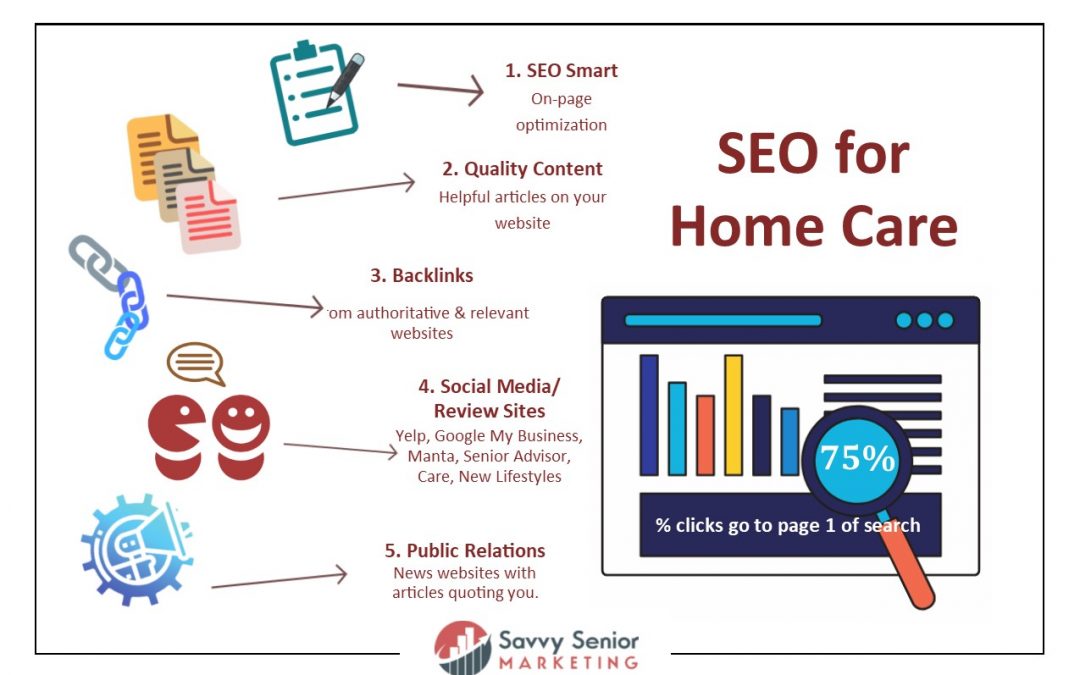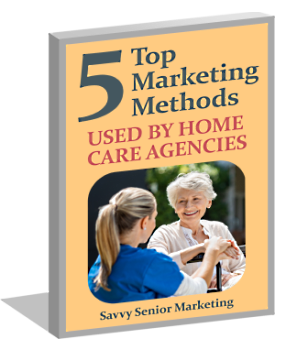Interview with Savvy Senior Marketing president Kevin Banet
Kevin explains how a personal experience led him to home care marketing and SEO for home care websites.
1. Kevin, how did you get involved in home care marketing?
Some years ago my dad, who was 88 years old, slipped and fell and couldn’t get up. He was living alone in his apartment. For three days we knew nothing of his plight. We found him later, took him to the hospital, and after that he lived with my sister.
That made a profound impact on me, and I saw the need for taking better care of our elderly. Thus there is a need for caretakers to come right into the home on a regular basis to check up on our seniors. You never know, because my dad seemed very healthy at the time, and even walked for twenty minutes a day up until then.
2. What is your background in marketing?
I started my career as a newspaper reporter for the Sun-Journal in Lansing, IL. Then I worked as a public information director for a nonprofit organization that teaches natural family planning. After that I worked in various positions, mostly for Catholic organizations, in printing and publishing. Later I learned some programming and built a database and a website when the internet was new.
3. So you’ve always had writing and technology in your background?
Yes, I’ve enjoyed the writing, marketing, and the technical parts of it all. Public relations and advertising always depend on good writing. Writing goes hand in hand with sales, which of course is direct contact with prospects. I’ve always said that advertising and PR are the little brothers of sales.
4. How do sales and marketing work together when it comes to home care marketing?
Sales is primary. You have to meet people, develop your referral network, and develop relationships. Our work here at Savvy Senior Marketing is to provide electronic and direct mail marketing. And that is secondary to the home care agency. But it is essential. Marketing complements sales. Your marketing person needs to be adept at Facebook, Twitter, LinkedIn, and email marketing. That’s where we come in, in building up these areas, while adding search engine optimization (SEO) and public relations to the list.
5. How important is search engine optimization for a home care business?
Everyone trusts Google. When they search for a local business, they want to find who’s the best in the business. And Google has become more sophisticated over the years, weeding out black-hat techniques more and more over the years. These are techniques that cheat the system. Those who violate the rules are penalized or “slapped” by Google.
We have found a 34% increase in searches for the term “home care agency” over a four-year period. Thus, more people in their 50’s and 60’s are using search to find such agencies.
One important factor recently is whether your website is mobile-friendly. More and more people are moving from desktops to cell phones and other mobile devices. If they see that your website has small print on their cellphone, or they have to scroll sideways and so on, they will simply abandon your site and go to your competitor. Many home care owners are unaware of how their website looks on mobile, or they think it is too minor a problem to deal with. But many of the people who meet with their salesperson will look up their company on mobile. If it looks unprofessional, that’s a real turn-off.
Furthermore, SEO is a zero-sum game, since only ten businesses can get listed on the first page on what we call the organic, or non-paid listings. The listings on the top and bottom of a Google page are marked “Ad” and are paid listings, of course.
6. How many home care providers use search engine ranking systems today?
I would say a fair number. We at Savvy Senior Marketing are conducting an informal study among smaller home care marketing agencies, in other words those that are not part of national franchises.
We are finding, in the early data, that 46% of these smaller agencies ranked on the first page of Google for a search under the term “home care” along with the name of their city. Fifteen percent were on page two, and 38% were not even on the first ten pages of Google. This means that 53% are not listed on page one of Google for their own type of business in their own city. They would do well if they achieved a first-page ranking. The data seems to show that nearly half of home care agencies are actively pursuing good SEO, probably with a monthly program. A few are putting some effort into it, but then a little more than a third are ignoring it. They are being left in the dust.
This is because on Google (which gets about 90% of search traffic), the first non-paid position gets about 33% of clicks, the second 15%, and the third about 9%. Another 18% goes to the first page. Thus, about 75% of clicks go to the first page of search results. SearchEnginePeople.com, 2017)
7. What can smaller home care providers do to get high rankings?
First of all, they have to compete with national franchises who have large advertising budgets. To do that, they have to promote themselves as businesses who are locally-owned who have a stake in the community and are involved in it.
First of all, although one’s website must be optimized when it is built, successful SEO is an ongoing program of always adding to and improving your online content. Thus, marketing companies such as we at Savvy Senior Marketing offer monthly programs in which we are always tweaking, adding content, and measuring results.
Google says that it uses two hundred different parameters to rank websites, and it publicly explains what it looks for to get high rankings. SEO experts, on the other hand, read between the lines and are constantly monitoring what works with Google and coming up with their own theories.
In my opinion, we can more or less boil down SEO today to these Five Pillars of SEO for the Home Care Industry:
- On-page optimization
- Quality content
- Backlinks
- Social Media/Review Sites
- Public Relations
On-page optimization. This is where such factors as your website’s title and description tags – seen only in the page’s source code – must be correct. Your website must also load quickly enough and should have the SSL security standard. Image tags must be in order, and overall, your website should be easy to navigate and find information with. And of course, your site must be mobile-friendly, since more and more people are turning to their mobile devices for search.
Quality content. The material you offer must be helpful, informative, and timely. It’s important to make it easy to read with bullet points, images and other ways to break up the text. Links to other pages, and to external websites make research and verification better. And finally, the phrase “content is king” still has a lot of strength. It’s better to have a limited number of pages that get updated regularly with fresh information than a zillion pages, many of which lose relevance over time.
Backlinks. Links take viewers from other websites and not only introduce new visitors to your business, but raise your status in the eyes of Google. Websites that are both authoritative and relevant to yours provide the best “link juice.” Thus, news sites are good for this, as well as industry publications. (See also public relations below.)
Social Media/Review Sites. Social proof is important. Recently, Google has given more weight to review sites such as Yelp, Google My Business, and the Better Business Bureau. Positive reviews help a lot, while negative reviews can hurt you. So home care agencies should claim their listings and ask happy customers to give them positive reviews.
It’s surprising to see how many small businesses have not claimed their spots on these sites. The review sites have already listed them, for better or worse. Your home care agency can verify them, upload pictures and descriptions, often at no cost.
Public Relations. This approach is very powerful and might take a while. I remember when I was a reporter, my brother, who was a lifeguard at the local pool, called up our paper during the summer for a feature story on their “Christmas in July” event. The paper covered the story, along with a photo of a Santa Claus sweltering in the summer heat. It was a big hit.
When it comes to the media, smaller local papers are more likely to give you coverage than big-city ones. Smaller papers will often take your press releases verbatim, since their staffs have dwindled over the years and they cannot afford to pay enough writers to do this.
If you can think of a clever idea like the one above, or of how your business is handling a local trend or problem, write up a press release and give the paper a call.
8. Why go with a marketing company that specializes in the home care industry?
That’s a good question. Marketing firms that specialize in the home care industry offer the advantage that they are experts in the field and follow the trends. They also often have much industry-related content at their fingertips, such as ebooks and press releases that can be white-labeled to your agency.
When it comes to getting a story placed in the local media, they know the home care issues, current legislation and issues of the day as they relate to home care. Thus, they are more likely to get that coveted coverage in the local press.
Would you like to get more home care clients with search engine optimization? We at Savvy Senior Marketing will be happy to talk to you about getting higher rankings in search, as well as working with the local press for good coverage. Learn more about our SEO service. Call us at the number at the top of this website or contact us by email.
Like our post? Why not share it on your website with the link below? Thanks!


